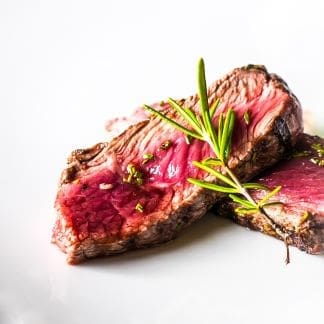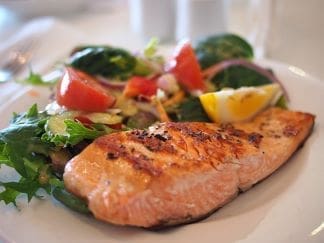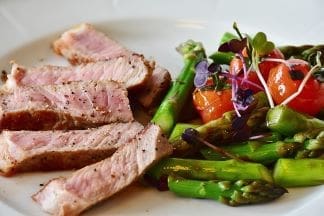How to Improve Your Health with Nutrition:
Everything you need to know about adopting a low carb high protein diet.
Implementing a well-thought-out wellness plan is one of the best ways to take control of your health and take back power from it. Most people begin their wellness plans by prioritizing exercise and diet; all diets focus on three key macronutrients (protein, fats, and carbohydrates).
Sugars, starch, and fiber – three forms of carbohydrates – can be found in all food, but more abundantly in foods like cereal, bread, pasta, oatmeal, cereal, and other grains, fruits, potatoes, legume, and certain dairy products. Even healthier vegetables like broccoli and kale contain carbohydrates. In comparison, meat, fish, poultry, eggs provide few carbs with most of their calories coming from proteins or fat.
Consuming carbohydrates has many health advantages, yet some individuals worry they contribute to weight gain and spikes in blood sugar. Although that might not seem like much, often those individuals also struggle with portion control when it comes to carb consumption. A low-carb diet seeks to minimize carb consumption as much as possible by emphasizing proteins and fats while restricting high-carb food choices; this approach may work best if steak, chicken, and scrambled eggs are your go-to meals.

What Is a Low-Carb High protein diet?
A low-carb diet by definition restricts carb intake; however, there are no strict limits regarding how many carbohydrates one may consume on an overall low-carb diet plan. There are various low-carb diets, like Keto and the Atkins Diet, with more restrictive carb intake values; however, “low-carb diet” refers to any eating pattern which restricts carb consumption. Food consumed on a low-carb diet varies depending on who is following it, since no single food must be included. That being said, most low-carb diets limit carbohydrates to 25% of their caloric intake per day while protein and fat provide 75% (with flexibility in regard to relative proportions of each).
What Are the Advantages of Low-Carb Diets?
Like other popular diets, low-carb diets aim to help people shed unwanted weight while improving overall health. Excess sugar consumption has long been linked with weight gain and obesity as it increases insulin secretion; by restricting carb consumption dramatically sugar intake.
As many people experience significant weight loss after starting a low-carb diet, some report experiencing less cravings, easier satiety, and decreased binging urges. Following a low-carb diet can decrease availability and accessibility – and consequently caloric intake- by default. Individuals suffering from insulin resistance metabolic syndrome or type 2 diabetes often report improvements in blood sugar regulation after adopting such a diet.
What foods should be consumed on a low-carb diet?
Low-carb diets emphasize eating unprocessed, unrefined proteins and fats rich in protein or fat content while still getting essential antioxidants, vitamins, minerals, and fiber in one’s diet:
Meat products such as beef, pork, veal, lamb, venison, and bison can all be found here. Fish and Seafood options such as salmon, cod, trout, tuna, sardines, lobster, crab, shrimp, scallops, mussels etc. are also readily available for consumption. As for poultry: chicken, duck, turkey, and eggs all make for tasty treats!
High-Fat Dairy products: Whole milk, cream, cheese, cottage cheese, butter etc. Non-Starchy Vegetables: Kale, Spinach, Swiss Chard, Zucchini, Broccoli, Onions, Cucumbers, Cauliflower, Asparagus, Radishes etc. Low Sugar Fruits: Pears, Oranges, Apricots, Melons, Berries, Lemons, Coconut, Kiwi etc.
Nuts and Seeds: Pistachios, Almonds, Walnuts, Pecans, Cashews, Chia Seeds, Pumpkin Seeds Flax Seeds, Sesame Seeds Sunflower seeds, Macadamia nuts, Brazil Nuts etc.
Herbs and Spices: Peppercorns, Basil, thyme, nutmeg, cinnamon, ginger, salt, cumin, rosemary, chili powder etc. Unsweetened Beverages: Water, Green tea Black tea, coffee, red wine, milk etc.

The following can be eaten in moderation depending on your individual dietary and energy needs:
Root Vegetables: Carrots, Parsnips and Beets etc.; Pineapple, Bananas, Papaya, Pomegranates, Apples, Plums etc.; Legumes (Peas, Beans, Lentils Peanuts etc.) Sprouted Grains and Seeds such as Barley, Oats, Quinoa, Brown Rice etc., And chocolate!
What foods should be avoided on a low carb high protein diet?
The primary goal of a low-carb diet is limiting any sweet or high in carbohydrates foods; most are banned completely while others should only be eaten rarely and in moderation. Achieve this goal by eating no more than 25% of daily caloric intake from carbs as high-fiber complex carbs should comprise most of those carbohydrates instead of simple sugars like simple glucose or cornstarch.
Most Grains: bread, pasta, bagels, crackers, rice cakes, cereal, oatmeal, rice.
Starchy Vegetables: Potatoes and sweet potatoes for starchy carbohydrates respectively and Dried Fruit such as raisins, prunes, dates etc. for their protein source and fiber.
Sweeteners such as sugar, corn syrup, honey, agave syrup and as well as jams, jellies, and pudding, fruit juices, soda pop, or sweet tea are great sweeteners to exclude as part of your low-carb diet meal plan. Furthermore, desserts and sweets like ice cream, pastries, cookies, pudding doughnuts, pies should not be eaten on low carb diet meal plans.

Below is a sample low carb high protein diet meal plan:
Looking for an example of what life might be like on a low-carb diet? Below we present our sample low-carb meal plan:
Breakfast:
Omelet with cheddar cheese, green pepper, onion, and coffee.
Lunch:
Consist of chicken salad lettuce cups with tomatoes and feta salad.
Snack:
Berries and walnuts.
Dinner:
Grilled salmon over zucchini noodles with asparagus as a side.
A low-carb diet is an effective way to decrease systemic inflammation and improve overall health.


